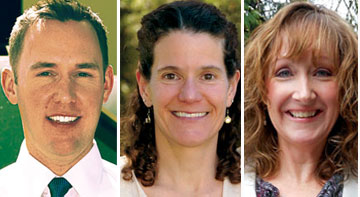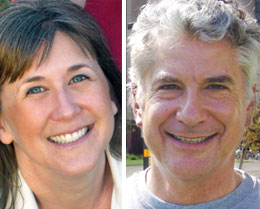Volume 29 · Number 4 · Summer 2012
Alumni: Major changes

Brian Rothstein, Christine Sublett and Eleanor (Lynch) Van Natta
Choosing a major often brings anxiety — and the inevitable question from family and friends: How can you get a job in that field? But career success sometimes depends less on the subject studied than on the skills learned. Here are the stories of five alums working in fields vastly different than their majors.
Brian Rothstein '98
Major: art studio
Occupation: strategic planning manager, Southern California Edison
As an art studio student, Brian Rothstein never envisioned working in the energy industry. He studied under famed painter Wayne Thiebaud and other UC Davis art faculty, and volunteered as a technician in a campus print laboratory.
But Rothstein said he enjoys the ever-changing environment of his job. "I hate being bored, and that's pretty much impossible in this industry," Rothstein said.
"Teaching art would have been rewarding, but it was never my dream. I'm happy with creating art for pleasure and not as a means to support myself."
Lasting lessons: Rothstein said his undergraduate degree did not go to waste — he still uses many of the skills he honed in his studio art courses: "A good art class forces you to solve problems in a creative way, and energy is full of problems that demand creative solutions."
Christine Sublett '89
Major: anthropology
Occupation: security, privacy and risk management consultant
Fascinated with ancient cultures and their written languages, Christine
Sublett came to UC Davis with dreams of becoming an archeologist. She pictured herself taking part in excavations and cataloguing artifacts in the Southwestern United States or the Middle East.
As an undergraduate intern, she catalogued the UC Davis Native American basketry collection, worked for the Far Western Anthropological Research Group and completed several independent study courses on a variety of ancient writing systems. But Sublett, whose father was a computer programmer, found she was devoting more of her free time to computers. "I found myself spending more and more time working on technology projects, even while working in the field of archaeology," she said.
After a year of graduate studies at San Francisco State University in education, she found herself heading in a different direction: information security and technology.
Today, she runs a security, privacy and risk management consulting firm in the San Francsico Bay area — advising hospitals, universities and healthcare companies.
Lasting lessons: "Anthropology can open doors to a variety of career paths, since studies include topics such as thinking skills and global studies critical to succeeding in research and business," she says. "I am able to assess and manage risk associated with not only technology but also human-centered and context-based risk, and the correlations between sources of risks and human reactions to those risks."
Eleanor (Lynch) Van Natta '89
Major: zoology
Occupation: book publicist
Eleanor (Lynch) Van Natta started UC Davis with the idea of becoming a veterinarian. "I loved animals, and I just thought it made sense to become a veterinarian, even when I struggled and burned the midnight oil trying to get through chemistry and genetics," she said.
But after taking her first meat lab and attending a People for the Ethical Treatment of Animals presentation, Van Natta switched majors from animal science to zoology. And by the time she graduated, she decided to leave her career to fate.
Alumni profiles
Eighteen days after commencement, she packed all her belongings into her car and moved to Seattle. She took the first job she was offered, an administrative assistant position, then worked her way into sales and marketing. After taking time off to start a family, she was approached by an author friend about helping to publicize her books.
"I didn't even know what a book publicist was until my friend asked me to be one," Van Natta said. "It was a success from the start, and shocked both of us how well I fit into the position."
Lasting lessons: Van Natta now specializes in publicizing nonfiction books. "Ultimately, the well-rounded education I received allowed me to go in multiple directions, so I never needed to fear that my degree was being wasted."

Heather Villa and Timothy Lease
Heather Villa '92
Major: international relations
Occupation: freelance writer
A former exchange student to Sweden and Russia, Heather Villa wanted a college education that would lead to a career with the U.S. Foreign Service.
She received an associate's degree in political science from Sacramento City College, then her bachelor's in international relations from UC Davis, learning to speak Swedish along the way.
Since graduating, she has left the country only one time — to visit Sweden as a tourist. She worked as a cartographer for several years. She later had the chance to stay home with her daughter and, during this time, began informally helping people edit documents, programs, résumés and articles. She even wrote a biography for a neighbor who is an artist. "I figured out that writing is something that I can do anywhere or anytime," Villa said.
Now her home is her office. She writes for various online magazines such as Shareable and Firefighter Nation in hopes of inspiring those around her with topics that she believes need to be heard. She is working on her first novel, about a girl who helps others.
Lasting lessons: "International relations taught me that the far corners of our world are delicately connected, and our daily decisions, seemingly insignificant, affect others. That is a lesson that any of us can apply."
Timothy Lease '80
Major: animal science
Occupation: chiropractor
Another aspiring veterinarian, Timothy Lease, volunteered at three pet hospitals before he started college. "It was natural to go on and major in animal science," he said.
At UC Davis, he worked with animal science professor Janet Roser in researching equine estrous regulation, with veterinary school still a goal. After graduating, however, he chose another medical field, and went to the Los Angeles College of Chiropractic.
Lease said his career path is not as uncommon as it sounds — many animal science majors pursue careers in medicine. Among his chiropractic patients are expectant mothers, children and young athletes. In December, he plans to retire to start a new international career with an anti-aging skin care and nutrition company.
Lasting lessons: "Animal science was the right match for me, and it certainly was very compatible with my career choice of chiropractic medicine."
Leslie Cory, a junior majoring in communications and psychology, is publications assistant for CAAA.
